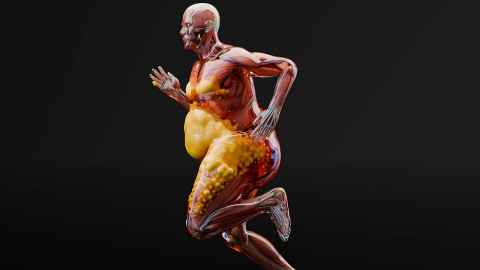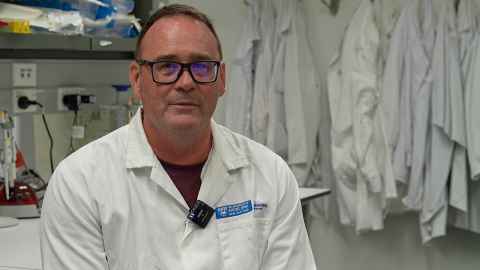Inside the new science of obesity
20 October 2025
Genetics, gut bugs, drugs and surgery – how groundbreaking research is changing how we understand and treat one of our most intractable health problems.

On a warm Saturday morning in June 2022, a packed audience of doctors and researchers filled a conference centre in downtown New Orleans. They were there for the 82nd annual scientific meeting of the American Diabetes Association, and they were on tenterhooks for one research statistic – the results of a much-anticipated trial of a new obesity drug called tirzepatide.
“You could hear a pin drop,” says Professor Rinki Murphy, one of New Zealand’s top specialists in obesity and diabetes and a Professor of Medicine at Waipapa Taumata Rau, University of Auckland.
“At the end of the slide deck, people stood up and clapped – and you don’t really clap in these conferences.”
The trial results showed people lost just over 20 percent of their body weight using the once-weekly injection. “That was just unheard of,” Murphy says.
For decades, doctors had few effective options for people with obesity. “We had to come back to ‘eat less, move more’,” she says. But now a new class of drugs is changing the landscape.
This article comes from the latest episode of Ingenious, a podcast highlighting groundbreaking research and researchers from the University of Auckland. From genetics and hormones to gut bacteria and revolutionary drugs, scientists are forcing us to rethink what we thought we knew about fat, health and willpower.
The genetics behind obesity
Professor Paul Hofman, a paediatric endocrinologist at the University of Auckland, has watched the number of children diagnosed with type 2 diabetes climb from one or two a year in the early 1990s, to 30, even 40 a year now.
“These are teenagers under the age of 16 in the Auckland region,” he says. “They’re almost all Pacific and Indian ethnicities, which tend to be the high-risk ethnicities, and they’re all overweight – anywhere between 100 to 180 kilograms.”
Moreover, the obesity is intergenerational.
“Virtually all the families involved here have overweight mothers or grandmothers and fathers and grandfathers as well. So this is obesity propagating itself,” Hofman says.
The Ministry of Health suggests New Zealand has the third-highest proportion of obese people in the world, although that ignores World Health Organisation data suggesting small-population Pacific countries have significantly higher rates than anywhere else in the world.
What's not in doubt is one in three adults and one in ten children in New Zealand are obese.
“There's that classic, but wrong, stereotype that obese people are sloths and gluttons and that is simply not the case,” Hofman says. “There is a programming effect here that is really hard to overcome.”
The sheer volume of people who’d be eligible for [weight loss] medications would bankrupt our country. Our entire health budget wouldn’t cover it.
Hofman is talking about epigenetics – a relatively new field of study which looks at how external factors can change the way our genes work.
“We have genes, and our genes are formed from DNA and our genetic code determines who we are. But if it was just our genetic code, it would be very inflexible; we would have no way of changing the genes we have. Over time, we have developed a lot of flexibility.”
That flexibility allows humans to adapt while they are still in the womb. Hofman calls it a “predictive adaptive response” – the foetus preparing for the environment it expects. Trouble is, if you have a situation where your predictive adaptive response is not predictive – if for instance, you predict a lack of food, so you adapt yourself to a lack of food, and then you have a large amount of food - those adaptations become maladaptive, he says.
Babies starved in the womb but born into a world of plenty are at higher risk of obesity, diabetes, and heart disease later in life. The reverse can also be true: overnourished babies develop larger appetites.
“Over the last 50 or 60 years, we’ve had an issue of way too much food. Overnutrition to the baby before birth has increased birth weights. Everybody thinks it’s great having a fat bonnie baby, but it seems to programme you for increased appetite."

Drugs that finally work
When drugs like Wegovy and tirzepatide emerged, they promised to interrupt that cycle. Wegovy, the weight-loss version of diabetes drug Ozempic, helps people lose 15 percent of their body weight, on average. Tirzepatide goes further; it mimics not one but two hormones that regulate appetite and blood sugar.
For Murphy, these medications represent a turning point.
“There is an extraordinary pressure that people feel when they have clinical obesity – that self-blame and stigma. For people able to fund this medication, it’s going to be a game changer – to be able to experience lack of food noise, lack of having to think about and constantly battle and negotiate over food choices and food amounts."
However, the price remains prohibitive for most people: it costs around $500 a month for Wegovy in New Zealand, and tirzepatide (branded as Mounjaro) is not yet approved.
“It would bankrupt our country for the sheer volume of people who’d be eligible for these medications,” Murphy says. “Our entire health budget wouldn’t cover it.”
Still, she is optimistic the drugs will become cheaper over time and will produce benefits for a number of obesity-related conditions, including heart disease, sleep apnea, and type 2 diabetes.
Critics argue that when people stop the injections, weight returns. Murphy’s reply: “It’s like blood pressure medications. If you stop taking them, you stop getting the benefits.”

In families where an obese mum has a child, then has bariatric surgery and another child, the children born before the surgery are significantly more likely to be obese.
A glimpse of what’s possible
If the new obesity drugs show what might be possible in the fight against obesity, bariatric surgery shows what’s already happening. For decades, operations like the gastric sleeve and bypass have offered the most effective way to reduce weight and reverse metabolic disease, and they provide a window into what the long-term health effects of successful drug therapy could be.
“The documentation of relief of complications like diabetes, obstructive sleep apnea, fatty liver, improvements in coronary events and strokes has placed bariatric surgery more in the metabolic space than as a cosmetic treatment,” Murphy says.
Mental health improves too. “We’ve done a study looking at anxiety, depression, quality of life – and they all improve for most people afterwards.”
Perhaps most striking are the cross-generational effects.
“In families where an obese mum has a child, then has bariatric surgery and another child, the children born before the surgery are significantly more likely to be obese,” Murphy says.
The gut-bug frontier
Meanwhile, a University of Auckland-based breakthrough may soon join the toolbox – and it starts with what might sound like science fiction.
At the University’s Liggins Institute, Professors Wayne Cutfield and Justin O’Sullivan have been testing whether the gut microbiome can shift obesity risk using fecal microbiota transfer – or, more bluntly, 'poo pills.'
The idea is simple but radical: take gut bacteria from healthy, lean donors and transplant them into the digestive systems of people with obesity to see if it improves health.

In the study, 87 obese teenagers swallowed two dozen capsules containing either a placebo or carefully screened fecal matter from what the team called “super donors” – lean, active, healthy people with diverse gut bacteria.
Four years later, the effects were still visible.
“The ones who had the fecal microbiome transfer lost approximately 10 to 11 kilos on average,” O’Sullivan says. “But what really got us excited was that the metabolic syndrome scores dropped quite dramatically.”
Metabolic syndrome is a cluster of risk factors: high blood pressure, blood sugar and blood fat levels; large waist size; and low ‘good’ cholesterol. Reducing metabolic syndrome scores means lower risk of diabetes and heart disease, even without big weight loss.
More than a third of the original obese teenagers in the Liggins study had metabolic syndrome.
“The fact that, four years on, the treated teenagers still had the diverse microbiome from the transplant – and lower health risk markers – is significant,” O’Sullivan says. “It says you can modify the microbiome and it has an effect on clinical outcomes.”
His team has pinpointed a handful of bacterial species linked to that change. “That’s really powerful.”
The next step is developing a probiotic pill that could deliver the same benefits – a non-invasive treatment to support other therapies, he says..
This article comes from the latest episode of Ingenious, a podcast highlighting groundbreaking research and researchers from the University of Auckland. From genetics and hormones to gut bacteria and revolutionary drugs, scientists are forcing us to rethink what we thought we knew about fat, health and willpower.
Media contact
Nikki Mandow | Research communications
M: 021 174 3142
E: nikki.mandow@auckland.ac.nz